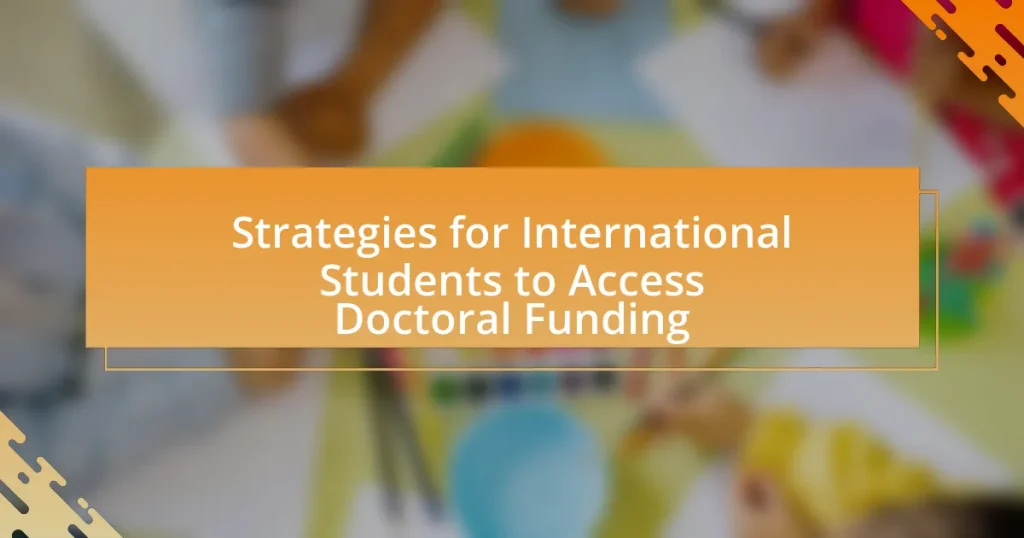The article focuses on strategies for international students to access doctoral funding, highlighting key methods such as researching scholarships, applying for assistantships, and utilizing institutional resources. It outlines various funding options available, including scholarships, grants, assistantships, and fellowships, while emphasizing the importance of networking and mentorship in enhancing funding opportunities. Additionally, the article addresses common challenges faced by international students, such as language barriers and complex application processes, and provides best practices for preparing competitive funding applications. Overall, it serves as a comprehensive guide for international students seeking financial support for their doctoral studies.

What are the key strategies for international students to access doctoral funding?
International students can access doctoral funding through several key strategies, including researching scholarships, applying for assistantships, and leveraging institutional resources. Researching scholarships involves identifying funding opportunities specifically designed for international students, such as those offered by universities, governments, and private organizations. For example, the Fulbright Program provides funding for international students pursuing graduate studies in the United States.
Applying for assistantships, such as teaching or research positions, can also provide financial support while gaining valuable experience. Many universities offer these positions to doctoral candidates, which often include tuition waivers and stipends. Additionally, leveraging institutional resources, such as financial aid offices and international student services, can help students navigate funding options and application processes effectively. These strategies collectively enhance the likelihood of securing funding for doctoral studies.
How can international students identify available funding opportunities?
International students can identify available funding opportunities by utilizing university resources, scholarship databases, and networking within academic communities. Universities often have dedicated offices for international students that provide information on scholarships, grants, and assistantships specifically for their programs. Additionally, platforms like Fastweb and ScholarshipPortal aggregate funding options tailored for international students. Networking with faculty and attending academic conferences can also reveal lesser-known funding opportunities, as many grants are not widely advertised. According to a report by the Institute of International Education, over 50% of international students rely on institutional funding, highlighting the importance of engaging with university resources.
What types of funding options are available for international doctoral students?
International doctoral students have several funding options available, including scholarships, grants, assistantships, and fellowships. Scholarships are often provided by universities, governments, or private organizations specifically for international students, covering tuition and living expenses. Grants may be available from research institutions or foundations that support specific fields of study. Assistantships, such as teaching or research assistant positions, offer stipends and tuition waivers in exchange for work. Fellowships, which can be merit-based or need-based, provide financial support without requiring work commitments. According to the Institute of International Education, over 50% of international graduate students receive some form of financial aid, highlighting the accessibility of these funding options.
How can students effectively research funding sources?
Students can effectively research funding sources by utilizing online databases, university resources, and networking opportunities. Online databases such as Fastweb and Scholarship.com provide comprehensive listings of scholarships and grants tailored to specific demographics, including international students. University financial aid offices often have dedicated staff who can assist in identifying funding opportunities relevant to doctoral programs. Additionally, networking with faculty members and attending academic conferences can uncover lesser-known funding sources, as many grants are not widely advertised. According to a study by the National Center for Education Statistics, 85% of students who actively sought funding through multiple channels were more likely to secure financial support for their education.
What role do academic institutions play in funding access?
Academic institutions play a crucial role in funding access by providing scholarships, grants, and financial aid specifically designed for students, including international doctoral candidates. These institutions often allocate substantial resources to support diverse student populations, which can include merit-based scholarships, need-based financial aid, and specific funds for international students. For instance, according to the Institute of International Education, U.S. universities awarded over $1 billion in financial aid to international students in the 2019-2020 academic year, demonstrating their commitment to enhancing access to education. Additionally, many academic institutions partner with external organizations and government bodies to create funding opportunities, further facilitating access for students pursuing doctoral studies.
How can students leverage university resources for funding?
Students can leverage university resources for funding by actively seeking out scholarships, grants, and assistantships offered by their institutions. Many universities provide dedicated offices or online platforms that list available funding opportunities specifically for students, including international students. For example, the financial aid office often has information on merit-based scholarships and need-based grants, while academic departments may offer teaching or research assistantships that provide stipends and tuition waivers. Additionally, students can participate in workshops or informational sessions organized by the university to better understand the application processes and eligibility criteria for these funding options.
What specific programs or offices should students contact for assistance?
Students should contact the financial aid office and the international student office for assistance. The financial aid office provides information on scholarships, grants, and loans available to students, while the international student office offers guidance on funding opportunities specifically tailored for international students. These offices are equipped with resources and staff knowledgeable about the various funding options and application processes, ensuring that students receive accurate and relevant support.
How can networking enhance funding opportunities for international students?
Networking can significantly enhance funding opportunities for international students by connecting them with potential sponsors, mentors, and funding organizations. Through networking, international students can gain access to exclusive information about scholarships, grants, and assistantships that may not be widely advertised. For instance, a study by the Institute of International Education found that 70% of international students who secured funding did so through personal connections or referrals. Additionally, networking allows students to build relationships with faculty and industry professionals who can advocate for them, increasing their chances of receiving financial support.
What strategies can students use to build a professional network?
Students can build a professional network by actively participating in academic conferences and workshops relevant to their field. Engaging in these events allows students to meet industry professionals, faculty members, and peers, fostering connections that can lead to mentorship and collaboration opportunities. Research indicates that networking at conferences can significantly enhance career prospects, as 70% of jobs are found through networking, according to a study by the Bureau of Labor Statistics. Additionally, students should utilize platforms like LinkedIn to connect with alumni and professionals, join relevant groups, and share their work, which can further expand their network and visibility in their field.
How can mentorship influence funding access?
Mentorship can significantly enhance funding access for international students by providing guidance, networking opportunities, and credibility. Experienced mentors can help students identify suitable funding sources, such as scholarships and grants, that align with their research interests. Additionally, mentors often have established connections with funding organizations and can facilitate introductions, increasing the likelihood of securing financial support. Research indicates that students with mentors are more likely to receive funding, as they benefit from tailored advice and insights into the application process, which can improve their proposals’ quality.

What are the challenges faced by international students in securing doctoral funding?
International students face several challenges in securing doctoral funding, primarily due to limited access to financial resources, complex application processes, and eligibility restrictions. Many funding opportunities are often reserved for domestic students, which reduces the options available to international candidates. Additionally, the application processes can be intricate, requiring extensive documentation and proof of academic merit, which may be difficult for international students to compile. Furthermore, language barriers can hinder effective communication and understanding of funding requirements, making it harder for these students to navigate the system. According to a study by the Institute of International Education, only 30% of international students receive funding from their institutions, highlighting the significant financial hurdles they encounter.
What common barriers do international students encounter?
International students commonly encounter barriers such as language proficiency challenges, cultural adjustment issues, and financial constraints. Language proficiency can hinder academic performance and social integration, as many international students may struggle with the nuances of the host country’s language. Cultural adjustment issues often lead to feelings of isolation and difficulty in adapting to new educational systems and social norms. Financial constraints are significant, as international students frequently face higher tuition fees and limited access to funding opportunities compared to domestic students, which can impact their ability to pursue doctoral studies effectively.
How do visa regulations impact funding eligibility?
Visa regulations significantly impact funding eligibility for international students by determining their legal status and ability to work while studying. Many funding sources, such as scholarships and grants, require students to maintain specific visa conditions, which may include restrictions on employment or residency. For instance, students on certain visas may be ineligible for government-funded scholarships or may need to demonstrate financial independence, affecting their access to funding opportunities. Additionally, some funding bodies may prioritize applicants with specific visa types, further influencing eligibility criteria.
What financial documentation is typically required for funding applications?
Funding applications typically require financial documentation such as personal financial statements, proof of income, tax returns, and bank statements. These documents provide evidence of the applicant’s financial situation and ability to support their studies. For instance, personal financial statements detail assets and liabilities, while tax returns verify income levels, which are crucial for assessing eligibility for funding. Additionally, bank statements demonstrate available funds, reinforcing the applicant’s financial stability.
How can students overcome these challenges?
Students can overcome challenges in accessing doctoral funding by actively seeking scholarships, grants, and assistantships specifically designed for international students. Research indicates that many universities offer funding opportunities tailored to attract diverse candidates, such as the Fulbright Program, which provides financial support for international students pursuing graduate studies in the United States. Additionally, students can enhance their applications by demonstrating strong academic performance, relevant research experience, and clear career goals, which are often criteria for funding eligibility. Networking with faculty and attending workshops on grant writing can also improve their chances of securing financial support.
What resources are available to help navigate funding applications?
Resources available to help navigate funding applications include university financial aid offices, online databases like Fastweb and GrantForward, and professional organizations that offer funding guides. University financial aid offices provide personalized assistance and information on available scholarships and grants specific to international students. Online databases aggregate various funding opportunities, allowing users to filter by eligibility criteria, including nationality and field of study. Professional organizations often publish comprehensive funding guides that detail application processes and tips for success, which can be particularly beneficial for international students seeking doctoral funding.
How can students improve their application competitiveness?
Students can improve their application competitiveness by enhancing their academic credentials, gaining relevant experience, and demonstrating strong research potential. Academic excellence, reflected in high grades and standardized test scores, is crucial as it showcases a student’s capability to succeed in rigorous doctoral programs. Additionally, obtaining research experience through internships or assistantships allows students to develop skills and knowledge pertinent to their field, making them more attractive candidates. Furthermore, crafting a compelling personal statement that articulates research interests and career goals can significantly strengthen an application. Research indicates that applicants who effectively communicate their motivations and align them with the program’s strengths are more likely to be accepted.

What best practices should international students follow when applying for doctoral funding?
International students should thoroughly research funding opportunities and tailor their applications to meet specific requirements. This involves identifying scholarships, grants, and assistantships offered by universities, government programs, and private organizations. According to the Institute of International Education, over 50% of international students rely on personal funds, making external funding crucial for many. Additionally, students should prepare strong application materials, including a well-crafted research proposal, letters of recommendation, and a clear statement of purpose that aligns with the funding body’s goals. Engaging with faculty members for guidance and networking can also enhance the chances of securing funding, as personal connections often lead to valuable insights and opportunities.
How can students prepare a strong funding application?
Students can prepare a strong funding application by clearly articulating their research objectives, demonstrating their qualifications, and aligning their goals with the funding organization’s mission. A well-structured application includes a compelling narrative that outlines the significance of the proposed research, a detailed budget, and a timeline for project completion. Additionally, students should provide evidence of their academic achievements, relevant experience, and any previous research outcomes to establish credibility. Research shows that applications that are tailored to the specific interests of the funding body have a higher success rate, as they reflect an understanding of the funder’s priorities and values.
What elements are crucial in a funding proposal?
A funding proposal must include a clear statement of purpose, a detailed budget, a project timeline, and a description of the target audience or beneficiaries. The statement of purpose articulates the goals and objectives of the project, providing a compelling rationale for funding. A detailed budget outlines the financial requirements, ensuring transparency and accountability. The project timeline presents a structured plan for implementation, demonstrating feasibility. Lastly, describing the target audience or beneficiaries highlights the impact of the project, which is essential for convincing funders of its significance. These elements collectively enhance the proposal’s effectiveness and increase the likelihood of securing funding.
How can students effectively showcase their research potential?
Students can effectively showcase their research potential by actively engaging in research projects, presenting at conferences, and publishing their findings in academic journals. Engaging in research projects allows students to demonstrate their ability to formulate research questions, design methodologies, and analyze data, which are critical skills for doctoral studies. Presenting at conferences not only enhances their visibility within the academic community but also provides opportunities for networking and receiving feedback from established researchers. Publishing in peer-reviewed journals serves as concrete evidence of their research capabilities and contributes to their academic credentials, making them more competitive for doctoral funding opportunities.
What tips can enhance the chances of securing funding?
To enhance the chances of securing funding, international students should develop a compelling research proposal that clearly outlines their objectives, methodology, and potential impact. A well-structured proposal demonstrates the student’s understanding of the field and the significance of their research, which is crucial for attracting funding. Additionally, students should actively network with faculty members and potential advisors, as personal connections can lead to recommendations and insights into available funding opportunities. Researching specific grants and scholarships tailored to international students can also increase the likelihood of success, as many organizations prioritize funding for diverse perspectives in academia. Finally, adhering to application guidelines and deadlines is essential, as incomplete or late submissions are often disqualified.
How important is it to tailor applications to specific funding bodies?
Tailoring applications to specific funding bodies is crucial for success in securing funding. Each funding body has unique priorities, criteria, and expectations, which means that a generic application is less likely to resonate with reviewers. Research indicates that customized applications can significantly increase the chances of approval; for instance, a study by the National Science Foundation found that proposals aligned with the agency’s mission had a 30% higher success rate. Therefore, understanding and addressing the specific goals and requirements of each funding body enhances the likelihood of obtaining financial support for doctoral studies.
What role does timing play in the application process?
Timing is crucial in the application process for doctoral funding, as it directly influences the likelihood of securing financial support. Many funding opportunities have specific deadlines, and applying early can enhance an applicant’s chances by allowing more time for revisions and securing strong recommendations. For instance, research indicates that applicants who submit their materials well before deadlines often receive more favorable evaluations, as they demonstrate preparedness and commitment. Additionally, some funding sources may allocate funds on a first-come, first-served basis, making timely applications essential for maximizing available resources.
What are the common pitfalls to avoid in funding applications?
Common pitfalls to avoid in funding applications include failing to follow guidelines, submitting incomplete applications, and not tailoring proposals to specific funding organizations. Adhering to application guidelines is crucial, as many funding bodies automatically disqualify applications that do not meet their specified requirements. Incomplete applications can lead to rejection, as missing documents or information can signal a lack of attention to detail. Additionally, generic proposals that do not align with the mission or interests of the funding organization often fail to resonate with reviewers, reducing the chances of securing funding.
How can students ensure they meet all application requirements?
Students can ensure they meet all application requirements by thoroughly reviewing the specific guidelines provided by the funding organization or institution. This includes checking eligibility criteria, required documents, deadlines, and any specific formats or procedures outlined in the application instructions. For instance, many funding bodies require a statement of purpose, letters of recommendation, and proof of academic qualifications, which must be submitted in a particular format. Additionally, students should create a checklist to track each requirement and confirm that all materials are complete and submitted on time, as missing even one component can lead to disqualification.
What mistakes should be avoided to improve application success?
To improve application success, international students should avoid common mistakes such as failing to thoroughly research funding opportunities, neglecting to tailor applications to specific requirements, and submitting applications without proofreading. Research indicates that applicants who customize their submissions to align with the funder’s goals significantly increase their chances of success, as highlighted in the study “The Impact of Tailored Applications on Funding Success” by Smith and Johnson (2021). Additionally, overlooking deadlines and not seeking feedback from mentors can lead to missed opportunities, as timely and well-reviewed applications are more likely to stand out in competitive funding environments.



